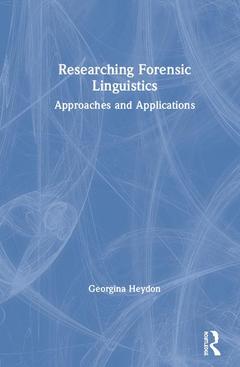Researching Forensic Linguistics Approaches and Applications
Auteur : Heydon Georgina

Researching Forensic Linguistics is an informative, hands-on guide to conducting research in forensic linguistics that can underpin legal and justice practices and address social justice problems involving language.
Georgina Heydon takes readers step by step through the research process using case studies that draw on different types of forensic and legal language data such as police interviews, anonymous reports of sexual assault, threatening letters and justice stakeholder interviews. Each chapter is framed by a language problem arising from either forensic linguistic case work or a key issue in language and the law. Up-to-date research methods in forensic linguistics are presented, including authorship attribution using online corpora, practice-based linguistic analysis and experimental techniques.
This is an ideal companion for linguists who want to apply their skills to a forensic setting, practitioners in the legal and justice fields seeking to understand how linguistic analysis can support their work, and any student undertaking research in forensic linguistics within English language, linguistics, applied linguistics and legal studies.
List of illustrations
Acknowledgements
Introduction
Part I Language Crimes
Chapter 1 Authorship Attribution Case File: Murder in Mackay
Chapter 2 Legal Language Interpretation Case File: Solvency and Semantics
Part II Police procedures
Chapter 3 Police Interviewing: Questioning Strategies in UK and USA Models of Training
Chapter 4 Lie Detection and Linguistics
Chapter 5 Police Cautions and Comprehension
Part III Legal Process
Chapter 6 Anonymous Reporting of Sexual Assault: Assessing the Value of Online, Form-Based Reporting
Chapter 7 Legal Investigative Interviewing: Questioning Strategies in Civil and Administrative Investigations
Chapter 8 Access to Justice: Post-Colonial Language Attitudes
Chapter 9 Generating Data for Forensic Linguistic Research
Index
Georgina Heydon is an Associate Professor of Criminology and Justice Studies at the Royal Melbourne Institute of Technology (Melbourne, Australia) and President of the International Association of Forensic Linguists. She has published extensively on the discourse and conversational structures of police interviews and other forms of crime reporting. Associate Professor Heydon regularly delivers interviewing training to police and judicial audiences around the world and provides expert evidence in court cases involving language issues.
Date de parution : 05-2019
15.6x23.4 cm
Date de parution : 05-2019
15.6x23.4 cm
Thèmes de Researching Forensic Linguistics :
Mots-clés :
Acquired Brain Injury; Extensive Field Interviews; Forensic linguistics; Lie Detection Abilities; language and the law; UK Home Office; Georgina Heydon; Investigative Environment; language crimes; ALR; authorship attribution; Institutional Review Board; Speaker Identification; Forensic Linguistic; Speech clarification; Forensic Linguistic Research; legal language; Police Interviewing; discourse analysis; Investigative Interviewing; RMIT University; Legal investigative interviewing; Data Sets; police cautions; Reid Method; legal interpreting; Human Lie Detector; Professional Development; Workplace Investigation; Police Interviewer; Non-target Forms; Cognitive Interviewing Methods; Lie Detection; Community Police Officers; Semantic Information



